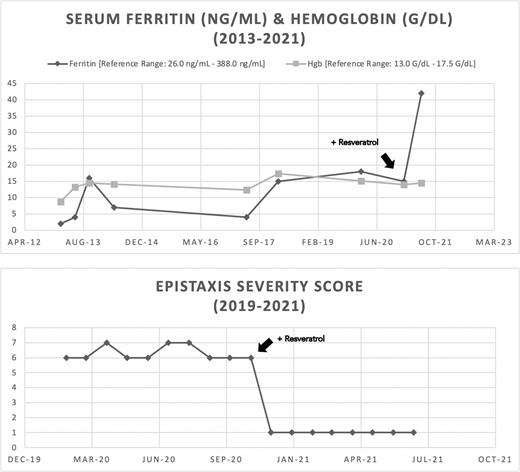Abstract
Introduction
Hereditary Hemorrhagic Telangiectasia (HHT) is an autosomal dominant disorder characterized by the development of arteriovenous malformations or telangiectasias that may affect any organ system, but are most prevalent in the nose and gastrointestinal tract. Nasal telangiectasia account for epistaxis, the most frequent manifestation of HHT, which may be frequent, debilitating and lead to decreased quality of life. Epistaxis is quantified by the Epistaxis Severity Scores (ESS), which ranges from 1-10 with higher scores associated with more severe bleeding. The diagnosis of HHT is based on clinical criteria and requires three or more of the following features: epistaxis, mucocutaneous telangiectasis, visceral AVMs, and/or a family history of HHT. HHT is associated with several mutations that may involve ENG, ACVRL1, or SMAD4; the latter occurs in only ~2% of HHT patients, which is also associated with the Juvenile Polyposis Syndrome (JPS), another autosomal dominant disorder associated with an increased risk for colorectal, stomach, small intestine, and pancreatic cancers.
Methods
Case report with serial ESS scores, hemoglobin and hematocrit monitoring.
Results
A 25-year-old male was diagnosed with JPS/HHT and a c.1081C>T mutation in SMAD4 leading to an R361C missense mutation was diagnosed in 2013. The patient had a longstanding history of frequent epistaxis leading to severe iron deficiency anemia and requiring at least two 750 mg iron infusions annually (total of 14), and did not improve with oral iron supplements. In December 2020, the patient initiated a 1 g daily dose of resveratrol for general anti-aging and health benefits. His epistaxis improved immediately, and his ESS decreased from 6 (consistent with severe bleeding) to 1 (no bleeding) over a two week period. The frequency, severity and duration of epistaxis all improved dramatically (Figure). No additional iron therapy has been required since initiation of resveratrol. Recent serum iron and ferritin values (6/2021) were both within normal limits.
Of interest, in parallel with the resolution of epistaxis, the patient also had a dramatic reduction in colonic polyposis after starting resveratrol.
Conclusions
There are no approved therapies for the treatment of HHT, and patients with this disorder may suffer from a markedly reduced quality of life due to unpredictable epistaxis and other manifestations. While a responses to bevacizumab have been reported in 60-70% of patients, treatment is expensive and may be associated with thromboembolic events, and patients may become refractory over time. Invasive approaches such as sclerotherapy may be initially, but only temporarily effective. Thus, there is an urgent need for better HHT therapies.
McCrae: Sanofi, Novartis, Alexion, and Johnson & Johnson: Consultancy, Honoraria; Dova, Novartis, Rigel, and Sanofi Genzyme: Consultancy.


